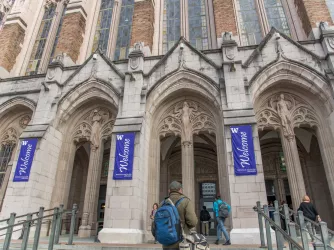Table of Contents
After 13 Years, First Amendment Student Newspaper Case Could Cost School $750,000
Over at the Student Press Law Center (SPLC), Adam Goldstein writes about Husain v. Springer, in which students at the College of Staten Island in New York sued the college president after she canceled a student election simply because a campus newspaper had written about it. Husain v. Springer is a long-running case, as it originated in 1997 (that's right, this case is even older than FIRE, which formed in 1999), and it involves the important First Amendment rights of student press on a public university campus, so it is useful to have this update from SPLC.
When the case initially went before the Second Circuit Court of Appeals, the federal appellate court held that the right to a free press was clearly established at the time of the college president's actions, and remanded the case to the district court to determine whether the college president could have thought her actions were reasonable given the state of the law. Furthermore, as Goldstein writes, the decision in the Second Circuit is noteworthy for another reason:
But that isn't what the decision is remembered for.
Chief Judge Jacobs wrote a dissent where he noted he did not read the majority opinion, insisted that "[t]his is a case about nothing," that the case was a "slow-motion tantrum by children," and that the newspaper in question was "illiterate piffle."
Judge Jacobs felt the case was about "nothing" because the students had already graduated and were only asking for nominal damages of one dollar each.
Goldstein eloquently refutes this dangerous notion:
Personally, I disagree. It is always more expensive to vindicate a civil right than it is to ignore it. It cost more money to make a world where Rosa Parks could sit in the front of the bus than it would have to preserve a world where she was forced to sit in the back, but I wouldn't characterize that as a "slow-motion tantrum" or a "case about nothing."
This is even more true in the case of schools, where a relatively fixed graduation date means that schools can always wait until a student plaintiff graduates to make all equitable claims moot. If we limited our understanding of justice in the way Judge Jacobs advocates in his Husain dissent, schools could abuse the civil rights of students with impunity, because it would be a trivial matter to drag out the litigation past graduation.
Exactly right. The right to vindicate fundamental liberties--such as those of free speech and a free press under the First Amendment--is paramount and should be preserved even where one seeks only nominal damages, and therefore should not be denied in the name of judicial economy.
Ultimately, the district court entered an award of $1 per plaintiff in nominal damages. The $9 award may not break the bank, but that the students thus vindicated their constitutional rights is significant in itself. It is a tribute to their determination through so many years of litigation and their willingness to stand up for what they believe.
But there's more. As Goldstein writes, the college may be in line to fork over quite a bit more financially:
[T]he attorney for the state recently requested more time to reply to the motion for attorney's fees, saying that the students' attorney was seeking more than $750,000.
Not bad for a case about nothing.
I am very interested to see how this case finally ends. If the students and their attorney prevail in full on this motion, I hope that the college (and its peers) learn a valuable lesson about dragging out litigation concerning the violation of fundamental constitutional rights. The relief sought in these cases may be nominal, but fighting against the Bill of Rights in court can end up costing them quite a bit more than bad publicity alone.
Recent Articles
FIRE’s award-winning Newsdesk covers the free speech news you need to stay informed.

FIRE’s defense of pollster J. Ann Selzer against Donald Trump’s lawsuit is First Amendment 101

University of Washington alumni seek to revive the spirit of free inquiry

Meta’s content moderation changes closely align with FIRE recommendations
